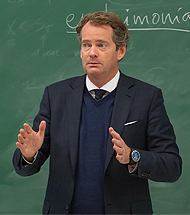“La gente sin recursos no tiene ni para comprar un par de manzanas, ¿cómo le vas a pedir un aval?”
Peter Fanconi, CEO de Blue Orchard, visita la Facultad de Económicas

“La microfinanciación trabaja para que la gente sin recursos pueda generar sus propios ingresos”, afirmó Peter Fanconi en la Universidad de Navarra. El CEO de Blue Orchard, empresa pionera en esta área, explicó a los alumnos cómo los préstamos sin necesidad de aval podrían combatir la pobreza en países en vías de desarrollo.
El proyecto de microcréditos de Fanconi se dirige a quienes sobreviven con solo 2 o 3 dólares al día. “La gente sin recursos no tiene ni para comprar un par de manzanas, ¿cómo les vas a pedir un aval? Su aval es la oportunidad única de sacar a su familia de la pobreza”, expuso el directivo.
De acuerdo con el CEO, cuya empresa ha invertido más de 3,5 billones de dólares en 60 países, el sistema de microcréditos es una manera de “alcanzar la sostenibilidad económica y garantizar que quienes viven en una situación de pobreza logren una mayor calidad de vida”.
Asimismo, aclaró que esta forma de financiación consigue una línea de doble alcance: “La inversión en microcréditos genera un impacto social y un impacto financiero. La actividad beneficia a todos, desde el inversor público o privado hasta el receptor del préstamo”. Este doble impacto se genera también con un efecto multiplicador, pues según Fanconi “por cada millón de euros que recibimos se generan como mínimo 200 préstamos individuales”.
Por otra parte, el ejecutivo señaló que el sector de las microfinanzas se trata de un ámbito aún muy desconocido pero de gran sostenibilidad, pues queda lejos de las amenazas de las inversiones al uso. “El impacto de la inversión no es inmediato sino a largo plazo, por lo que no nos afecta tanto el fenómeno Trump o las crisis económicas”, afirmó, “No dependemos en gran medida de la actualidad”.
Fanconi también quiso compartir con los estudiantes “lo fascinante de la industria” durante su propia experiencia en el sector: “Es impresionante, pero todos los hombres, de todos los países, de cualquier religión o ambiente, tienen una sola preocupación: dar lo mejor a su familia”. Finalmente, destacó que el sector de las microfinanzas debe su origen al exsecretario general de la ONU, Kofi Annan, que impulsó el proyecto para alcanzar uno de los ocho Objetivos de Desarrollo del Milenio: la erradicación de la pobreza.




